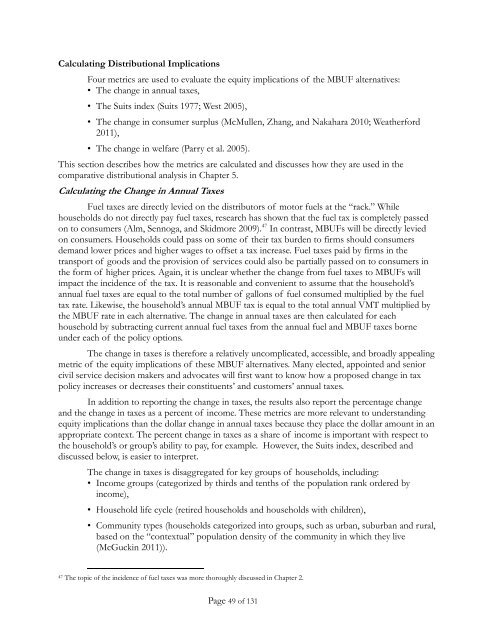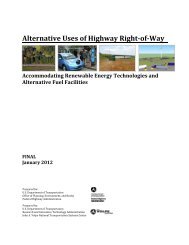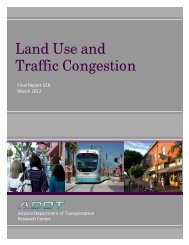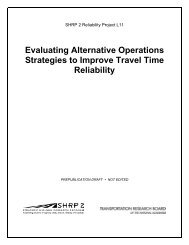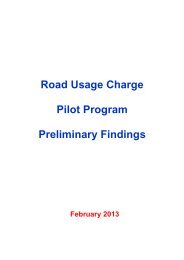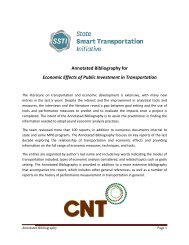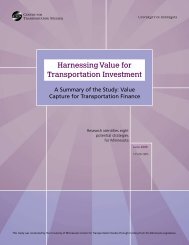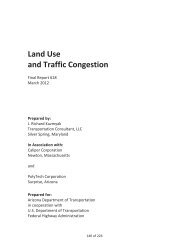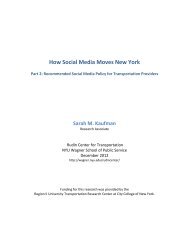Mileage-Based User Fee Winners and Losers - RAND Corporation
Mileage-Based User Fee Winners and Losers - RAND Corporation
Mileage-Based User Fee Winners and Losers - RAND Corporation
Create successful ePaper yourself
Turn your PDF publications into a flip-book with our unique Google optimized e-Paper software.
Calculating Distributional Implications<br />
Four metrics are used to evaluate the equity implications of the MBUF alternatives:<br />
• The change in annual taxes,<br />
• The Suits index (Suits 1977; West 2005),<br />
• The change in consumer surplus (McMullen, Zhang, <strong>and</strong> Nakahara 2010; Weatherford<br />
2011),<br />
• The change in welfare (Parry et al. 2005).<br />
This section describes how the metrics are calculated <strong>and</strong> discusses how they are used in the<br />
comparative distributional analysis in Chapter 5.<br />
Calculating the Change in Annual Taxes<br />
Fuel taxes are directly levied on the distributors of motor fuels at the “rack.” While<br />
households do not directly pay fuel taxes, research has shown that the fuel tax is completely passed<br />
on to consumers (Alm, Sennoga, <strong>and</strong> Skidmore 2009). 47 In contrast, MBUFs will be directly levied<br />
on consumers. Households could pass on some of their tax burden to firms should consumers<br />
dem<strong>and</strong> lower prices <strong>and</strong> higher wages to offset a tax increase. Fuel taxes paid by firms in the<br />
transport of goods <strong>and</strong> the provision of services could also be partially passed on to consumers in<br />
the form of higher prices. Again, it is unclear whether the change from fuel taxes to MBUFs will<br />
impact the incidence of the tax. It is reasonable <strong>and</strong> convenient to assume that the household’s<br />
annual fuel taxes are equal to the total number of gallons of fuel consumed multiplied by the fuel<br />
tax rate. Likewise, the household’s annual MBUF tax is equal to the total annual VMT multiplied by<br />
the MBUF rate in each alternative. The change in annual taxes are then calculated for each<br />
household by subtracting current annual fuel taxes from the annual fuel <strong>and</strong> MBUF taxes borne<br />
under each of the policy options.<br />
The change in taxes is therefore a relatively uncomplicated, accessible, <strong>and</strong> broadly appealing<br />
metric of the equity implications of these MBUF alternatives. Many elected, appointed <strong>and</strong> senior<br />
civil service decision makers <strong>and</strong> advocates will first want to know how a proposed change in tax<br />
policy increases or decreases their constituents’ <strong>and</strong> customers’ annual taxes.<br />
In addition to reporting the change in taxes, the results also report the percentage change<br />
<strong>and</strong> the change in taxes as a percent of income. These metrics are more relevant to underst<strong>and</strong>ing<br />
equity implications than the dollar change in annual taxes because they place the dollar amount in an<br />
appropriate context. The percent change in taxes as a share of income is important with respect to<br />
the household’s or group’s ability to pay, for example. However, the Suits index, described <strong>and</strong><br />
discussed below, is easier to interpret.<br />
The change in taxes is disaggregated for key groups of households, including:<br />
• Income groups (categorized by thirds <strong>and</strong> tenths of the population rank ordered by<br />
income),<br />
• Household life cycle (retired households <strong>and</strong> households with children),<br />
• Community types (households categorized into groups, such as urban, suburban <strong>and</strong> rural,<br />
based on the “contextual” population density of the community in which they live<br />
(McGuckin 2011)).<br />
47 The topic of the incidence of fuel taxes was more thoroughly discussed in Chapter 2.<br />
Page 49 of 131


